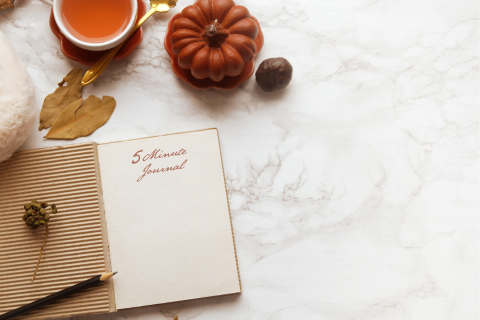 This Thanksgiving was not my most festive. I was feeling a little down. I was caught in a negative spiral. I was focusing on all the things that were bothering me. I needed to pull myself out of it. As usual, I took a deep breath and thought about all the things that I’m thankful for in my life. This reminded me of how my grandfather consistently focused my attention on gratitude. He did it long before it was a popular thing. He wouldn’t ever dismiss my feelings, but he did consistently draw my attention back to the positive, and he made it a point to teach me to do that on my own. I’m not sure how it occurred to him to teach me to think that way. He was doing it quite literally until the day he died.
This Thanksgiving was not my most festive. I was feeling a little down. I was caught in a negative spiral. I was focusing on all the things that were bothering me. I needed to pull myself out of it. As usual, I took a deep breath and thought about all the things that I’m thankful for in my life. This reminded me of how my grandfather consistently focused my attention on gratitude. He did it long before it was a popular thing. He wouldn’t ever dismiss my feelings, but he did consistently draw my attention back to the positive, and he made it a point to teach me to do that on my own. I’m not sure how it occurred to him to teach me to think that way. He was doing it quite literally until the day he died.
Because of my grandfather I’ve had a gratitude practice for most of my life. It’s one of the ways I take care of myself. I view it as a wellness practice. Wake up, breathe, and be grateful for another day on the planet as I open my eyes. See a beautiful bird, take a deep breath and focus on it with gratitude (I absolutely love birds). Throughout the day, refocus on what I’m grateful for. Before bed, take deep breaths and think about what I’m grateful for that day before closing my eyes.

I know gratitude practices work. A recent review of gratitude science by Emmons, Froh, and Rose says:
“From childhood to old age, a wide array of psychological, physical, and relational benefits are associated with gratitude. Gratitude has been shown to contribute not only to an increase in happiness, health, and other desirable life outcomes but also to a decrease in negative affect and problematic functioning, including in patients with neuromuscular disease, college students, hypertensives, patients with cancer, health care providers, and early adolescents”.
So if gratitude works, why hasn’t my practice been effective recently? I think it’s because it’s on autopilot in my brain. This may sound like a good thing, but doing things on autopilot means we can often do them mindlessly. Without intention and focus, our gratitude practices probably lose quite a bit of their power. We have to really stop and fully immerse ourselves in the feeling of gratitude for it to be authentic. I realized I had simply been noticing what I was grateful for but my attention was elsewhere. Just because the practices need to be done intentionally doesn’t mean they need to be done for a long time in order to be effective. In fact, research shows that building up our meditation skills with several minutes here and there is actually really good practice. The automatic impulse to practice gratitude or meditate or pray is a great thing to have on autopilot, but the actual practice needs to be thoughtful. The reality is it takes some work to integrate these practices into our daily lives so we actually remember to do them. Some people put notes around their houses, set timers on their phones, or use some other prompt that will help them to create the habit of checking in with themselves. However, if the actual practice itself becomes automatic without intentional thought, we start to have a problem.
 Gratitude, meditation, deep breathing, prayer, and mantras don’t really help us if we just do them quickly to tick off that self-care box on our to do list. If I see a bird and think to myself, “Grateful for birds, check!” while I continue to think about the email I’m writing, it’s not going to be as powerful as if I stop writing, stand up to look at the bird for thirty seconds while I breathe deeply and think about how grateful I am for nature, and sit back down again. The good news is that these practices really can be as quick as thirty seconds. The bad news is that it’s incredibly easy for our practices, even once we’ve established them, to start losing their power as we do them on autopilot. We often need to recommit ourselves to doing these things with full attention so that they can have maximum benefit.
Gratitude, meditation, deep breathing, prayer, and mantras don’t really help us if we just do them quickly to tick off that self-care box on our to do list. If I see a bird and think to myself, “Grateful for birds, check!” while I continue to think about the email I’m writing, it’s not going to be as powerful as if I stop writing, stand up to look at the bird for thirty seconds while I breathe deeply and think about how grateful I am for nature, and sit back down again. The good news is that these practices really can be as quick as thirty seconds. The bad news is that it’s incredibly easy for our practices, even once we’ve established them, to start losing their power as we do them on autopilot. We often need to recommit ourselves to doing these things with full attention so that they can have maximum benefit.
All of this is to say: Thanksgiving made me realize that I haven’t truly been practicing gratitude recently. I have so very much to be thankful for, and I really want to refocus my attention on those things. To help me, I’m going to do a gratitude workbook. I find tools like workbooks that are based on good research are really helpful for establishing a structure for the practice, focusing attention, increasing insight and awareness, and holding you accountable. If you’re looking for a gratitude workbook, I highly recommend this one because it’s backed by science and is based on the teachings of Brother David Steindl-Rast. I’ll write about my experiences with it in a future blog, so be on the lookout!
